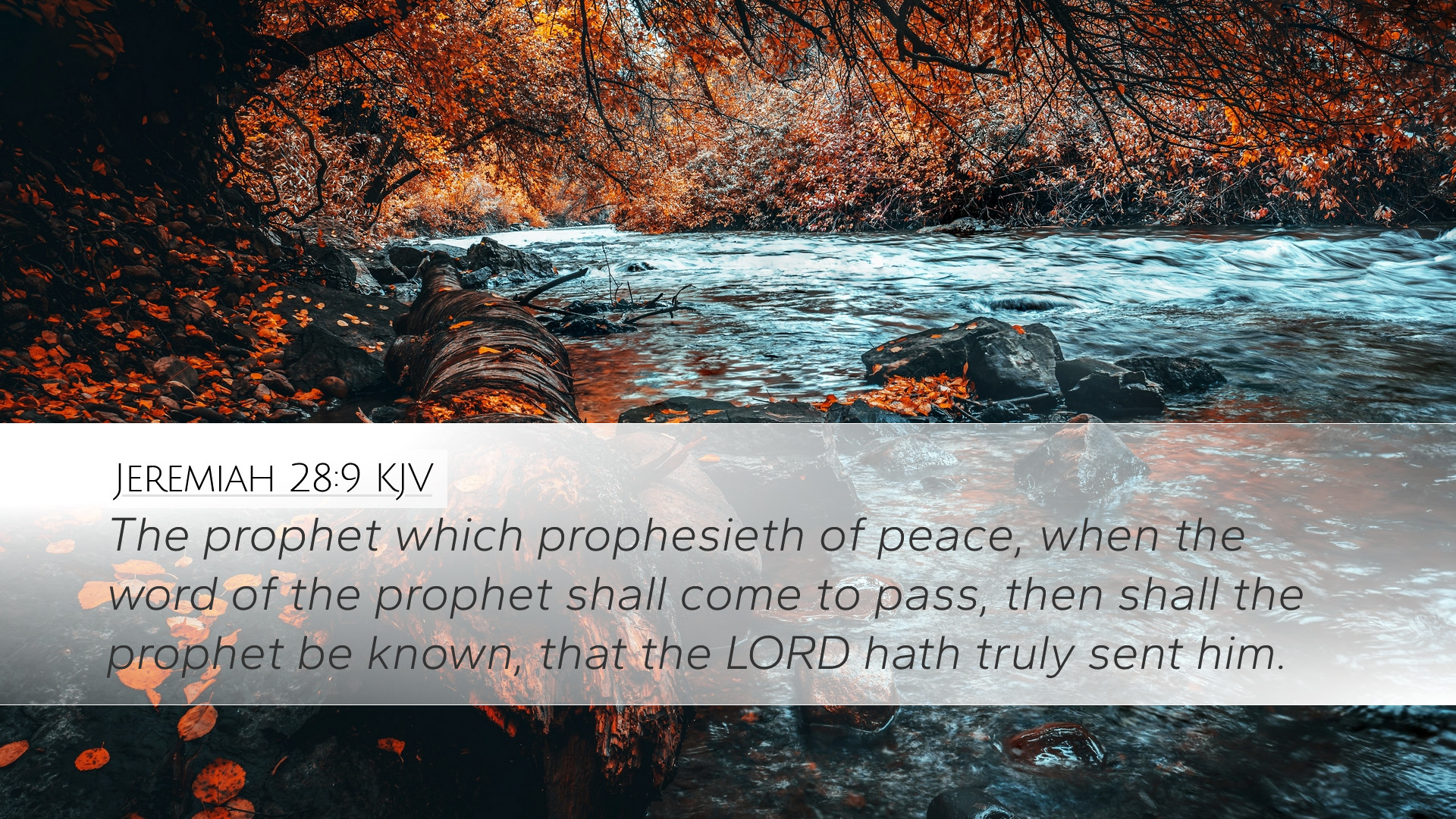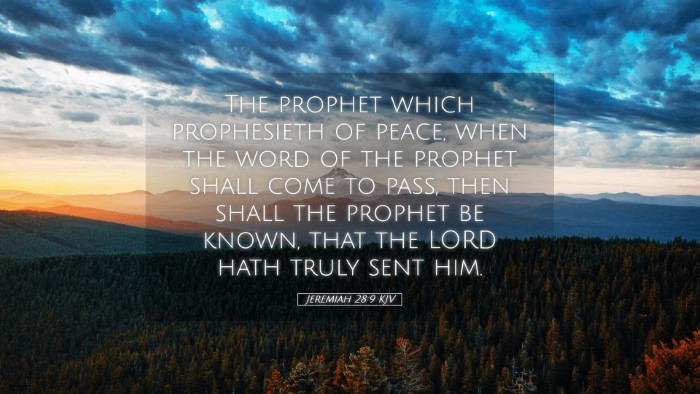Commentary on Jeremiah 28:9
Jeremiah 28:9 states: "The prophet which prophesies of peace, when the word of the prophet shall come to pass, then shall the prophet be known, that the LORD hath truly sent him."
Introduction
This verse is a critical part of the narrative between the prophet Jeremiah and the false prophet Hananiah. It highlights the theme of true and false prophecy, emphasizing that the fulfillment of a prophet’s words is the ultimate test of their divine endorsement. This commentary seeks to unpack the meaning of this verse through insights derived from public domain biblical commentaries.
Analysis of Jeremiah 28:9
-
Contextual Overview
Jeremiah, often referred to as the weeping prophet, delivered messages of doom and judgment against Judah's sinfulness. In contrast, Hananiah proposed a more optimistic message, claiming peace and restoration. This clash sets the stage for understanding the significance of true prophecy.
-
Status of Prophets
As per Matthew Henry, a prophet is known by the results of their prophecy. The real test of a prophet's authenticity lies in whether their declarations align with divine will and come to pass. Jeremiah argues that genuine prophecy is confirmed by future events, distinguishing true prophets from false ones.
-
The Nature of Peace
Albert Barnes emphasizes the peace promised by true prophets. According to Barnes, true peace follows repentance and obedience to God’s commands. The absence of fulfillment in Hananiah's proclamations serves as a warning against seeking comfort in messages that do not reflect God’s reality.
-
The Role of Testing Prophecies
Adam Clarke notes the biblical principle of testing prophecies as vital for discerning truth in the prophetic ministry. Clarke elucidates that while peace and hope are essential, they must coincide with alignment to God’s purposes and commands, reinforcing the idea that false prophets may arise during times of despair, leading believers astray.
Theological Implications
The implications of Jeremiah 28:9 hold substantial theological weight. The scrutiny of prophetic authenticity continues to be relevant to contemporary faith communities. There is a call for discernment in leadership and among congregants to evaluate messages against Scripture and God's revealed will.
The Test of Fulfillment
The fulfillment of prophecies is a pivotal theme across Scripture. Paul's letter to the Corinthians (1 Corinthians 14:29) encourages the weighing of prophecies. Just as Jeremiah indicates that the true prophet's words will come to pass, modern believers are also called to engage in careful reflection over teachings that claim divine authority.
Character of True Prophets
Moreover, true prophets must not only be reliable but also embody the character of Christ. Authentic prophetic voices are characterized by humility, accountability, and a deep commitment to the righteousness of God. This places a significant onus on proclaimers of the Word to align their lives with the truths they deliver.
Consequences for False Prophecy
Henry warns of grave consequences for leading others astray through false prophecy. The Lord's anger is kindled against those who misrepresent His will. This brings to light the urgent need for prayer and guidance as congregations strive for truth within the context of a world filled with varied doctrines and teachings.
Long-term effects on faith can be devastating when followers latch onto misrepresentations of God’s word. The resultant disillusionment often leads to a crisis of faith among believers. Therefore, clinging to God’s truth is paramount.
Practical Application
-
Discerning Messages
Believers are encouraged to develop a keen sense of discernment when it comes to the messages they absorb. Regular engagement with Scripture, prayer, and community conversations about faith can help mitigate the impact of false teachings.
-
Encouraging Accountability
Church leadership must foster a culture of accountability where prophets and teachers are open to scrutiny by scripture and the community. This accountability ensures that leaders reflect Christ’s character in their message and actions.
Conclusion
In conclusion, Jeremiah 28:9 serves as a profound reminder of the significance of discerning true prophecy from falsehood. It urges believers and leaders alike to uphold the integrity of God’s Word. As outlined by various esteemed commentators, the true measure of prophecy rests not only in the peace it promises but also in its ultimate fulfillment according to God’s sovereign plan. Such reflections elevate the discourse surrounding prophecy while instilling a deeper reliance on God and His revealed will.


